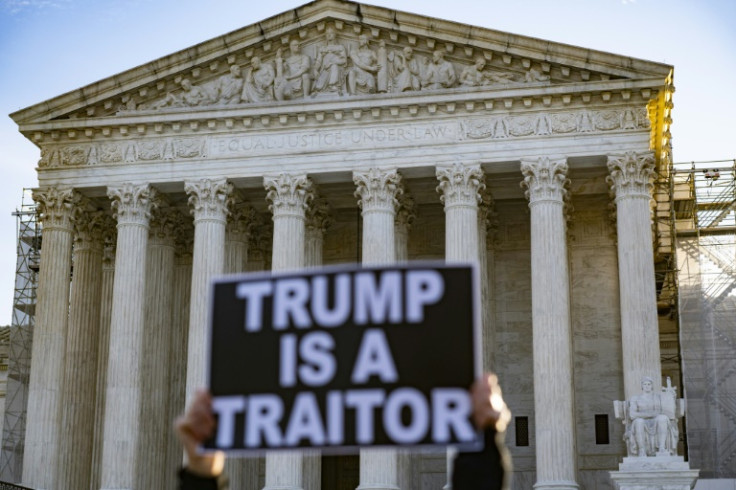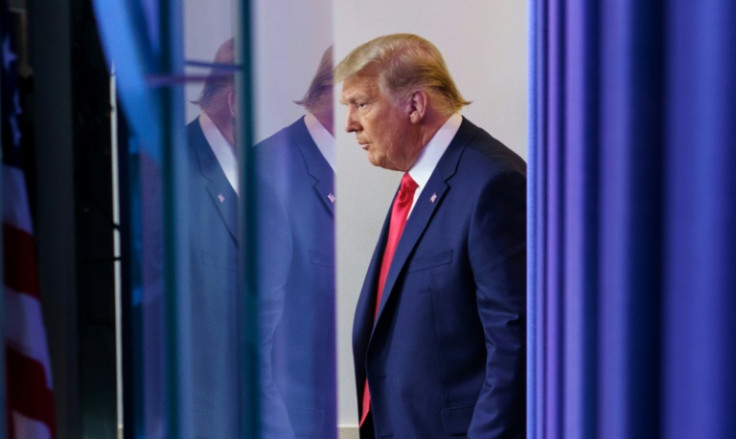
The US Supreme Court on Monday removed a potential hurdle to Donald Trump's bid to recapture the White House, unanimously dismissing a state court ruling that could have barred him from the ballot for engaging in insurrection.
The high-stakes ruling in favor of the former president came on the eve of the Super Tuesday primaries that are expected to cement Trump's march toward the Republican nomination to take on President Joe Biden in November.
It was the most consequential election case heard by the court since it halted the Florida vote recount in 2000 with Republican George W. Bush narrowly leading Democrat Al Gore.
The question before the nine justices was whether Trump was ineligible to appear on the Republican presidential primary ballot in Colorado because he engaged in an insurrection -- the January 6, 2021 assault on the US Capitol by his supporters.
In a 9-0 decision, the conservative-dominated court said "the judgment of the Colorado Supreme Court... cannot stand," meaning 77-year-old Trump, the Republican White House frontrunner, can appear on the state's primary ballot.
"All nine Members of the Court agree with that result," they added.
The case stemmed from a ruling in December by the state Supreme Court in Colorado, one of the 15 states and territories voting on Super Tuesday.
The court, citing the 14th Amendment to the Constitution, ruled that Trump should be kicked off the ballot because of his role in the January 6 attack on Congress, when a mob tried to halt certification of Biden's 2020 election victory.
Section 3 of the 14th Amendment bars anyone from holding public office if they engaged in "insurrection or rebellion" after once pledging to support and defend the Constitution.
But during two hours of arguments last month, both conservative and liberal justices on the US Supreme Court expressed concern about having individual states decide which candidates can be on the presidential ballot this November.
On Monday, the top court ruled that "responsibility for enforcing Section 3 against federal officeholders and candidates rests with Congress and not the States."
The 14th Amendment, ratified in 1868 after the Civil War, was aimed at preventing supporters of the slave-holding breakaway Confederacy from being elected to Congress or from holding federal positions.
The Supreme Court, which includes three justices nominated by Trump, has historically been loath to get involved in political questions, but it is taking center stage in this year's White House race.
Besides the Colorado case, the Supreme Court has also agreed to hear Trump's claim that he is immune from criminal prosecution as a former president and cannot be tried on separate charges of conspiring to overturn the 2020 election.
Trump was impeached by the Democratic-majority House of Representatives for inciting an insurrection but was acquitted thanks to Republican support in the Senate.
He is also scheduled to go on trial in New York on March 25 on charges of covering up hush money payments to a porn star ahead of the 2016 election.
In yet another case, Trump faces federal charges in Florida of refusing to give up top secret documents after leaving the White House.
During oral arguments in the Colorado case, Jonathan Mitchell, a former solicitor general of Texas representing Trump, urged the court to reverse the Colorado court's decision, saying it would "take away the votes of potentially tens of millions of Americans."
Chief Justice John Roberts, a conservative, warned that upholding the state court ruling could lead to "disqualification proceedings on the other side."
"I would expect that a goodly number of states will say 'Whoever the Democratic candidate is, you're off the ballot,'" Roberts said.








